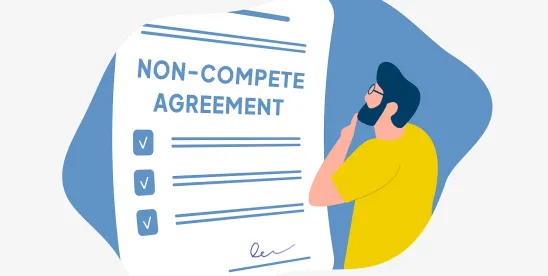In the latest reversal of employee-friendly Biden-era policies, the Trump Administration’s Federal Trade Commission (“FTC”) moved this week to vacate its rule banning noncompete agreements.
As we have written previously, noncompete agreements are widely used by employers to limit workers’ ability to compete with their former employer during or after employment. These broad covenants, to which many workers must agree as a condition of employment, restrict their freedom to pursue better jobs elsewhere. Studies have shown that noncompetes suppress wages, hamper innovation, and block entrepreneurs from starting new businesses. Noncompete agreements compound the power imbalances employees already face in relationships with their employers, and they exist only to protect employers. An estimated 30 million workers—nearly one in five working Americans—are subject to a noncompete agreement.
The FTC Rule Banning Noncompetes
In January of 2023, the FTC announced a proposed rule which would ban noncompete agreements nationwide. The public submitted some 26,000 comments almost entirely in support of a noncompete ban, and the FTC announced its final rule in April of 2024. The FTC noncompete ban would have invalidated nearly all existing noncompetes and banned new ones except in rare circumstances. This would have permitted workers to freely pursue new employment opportunities without fear of being sued by their former employers, leading to increased wages—to encourage employees to remain with their employers rather than search for higher wages elsewhere—and increased innovation and entrepreneurship as workers brought their varied skills and experiences to roles with new or competing employers. Then-Chair Lina M. Khan, Commissioner Rebecca Kelly Slaughter, and Commissioner Alvaro M. Bedoya voted in support of the final rule, and then-Commissioner Andrew N. Ferguson and Commissioner Melissa Holyoak dissented.
The FTC indicated in both its proposed rule and final rule that it anticipated numerous legal challenges. Indeed, it provided hundreds of pages of arguments and responses to comments attacking its legal authority to issue such an expansive rule.
Unfortunately, the ban never went into effect: the U.S. Chamber of Commerce intervened in the first major legal challenge to the FTC rule filed on May 9, 2024, arguing that the FTC did not have the authority to issue rules that define unlawful methods of competition. See Ryan LLC v. FTC, No. 3:24-cv-00986-E (N.D. Tex.). The District Court for the Northern District of Texas granted summary judgment in favor of the Chamber of Commerce, thereby prohibiting the FTC from enforcing the rule nationwide. The FTC appealed to the Fifth Circuit Court of Appeals. Ryan, LLC v. FTC, No. 24-10951 (5th Cir.).
The Trump Administration’s Opposition to the Noncompete Ban and Dismissal of its Appeal to the Fifth Circuit
When President Trump took office for his second term in January 2025, the Fifth Circuit had yet to rule on the legality of the FTC noncompete ban. President Trump selected then-Commissioner Andrew Ferguson, a fellow Republican, to replace Chair Lina Khan (a Biden appointee) as Chair of the FTC. About a month into his new role, Chair Ferguson shared with Fox Business that the FTC under his leadership would not prioritize broad, prescriptive regulations like the noncompete ban but instead would emphasize case-by-case enforcement of existing laws. Such piecemeal enforcement is considerably slower, less efficient, and less effective than the carefully considered ban the FTC had enacted. Such an approach also ignores the limited resources of the FTC, which is comprised of approximately 1,000 employees tasked with protecting consumers from unfair, deceptive, or fraudulent business practices and promoting competition by preventing anticompetitive mergers or other practices nationwide.
In March 2025, the FTC asked the Fifth Circuit for a 120-day pause on the FTC’s appeal, citing the changeover in the administration and comments by the new FTC Chair about the FTC’s shifting priorities. In July 2025, the FTC requested an additional extension to the pause, which the Court granted through September 8.
On Friday, September 5, 2025, just ahead of the deadline, the FTC voted 3-1 to dismiss its appeal of the District Court’s grant of summary judgment prohibiting the FTC from enforcing its rule nationwide. Chair Ferguson, along with Republican Commissioner Melissa Holyoak and Trump-appointee Commissioner Mark R. Meador (sworn in April 16, 2025), voted to dismiss the appeal, while Democratic Commissioner Slaughter dissented.
Looking Forward
On September 4, 2025, just before dismissing its appeal of the District Court’s injunction of the noncompete ban, the FTC invited the public to come forward with information to help the FTC understand “the scope, prevalence, and effects of employer noncompete agreements, as well as to gather information to inform possible future enforcement actions.” As detailed above, the FTC had already received, reviewed, and analyzed more than 26,000 public comments to its proposed rule, and it had addressed these in detail. Nevertheless, the FTC announced a 60-day comment period for the public to submit comments at Regulations.gov (deadline November 3, 2025).
The FTC also formally announced what now-Chair Ferguson had hinted in February: the FTC plans to pursue enforcement actions for noncompete violations industry-by-industry instead of implementing a nationwide ban. As an example, and supposedly to demonstrate the FTC’s dedication to enforcement actions, the FTC announced that it had ordered the country’s largest pet cremation business to stop enforcing noncompetes against its nearly 1,800 employees.
It is readily apparent that the FTC’s pursuit of enforcement actions on an ad hoc basis will do little to meaningfully protect the 30 million Americans restricted by noncompetes if the agency’s self-selected exemplary enforcement action impacts fewer than 2,000 employees in a niche industry. Such actions do not suggest a serious commitment to eradicating a pervasive, explicitly anticompetitive practice.
As then-Chair Lina Khan said of the final rule in April 2024: “Noncompete clauses keep wages low, suppress new ideas, and rob the American economy of dynamism, including from the more than 8,500 new startups that would be created a year once noncompetes are banned… The FTC’s final rule to ban noncompetes will ensure Americans have the freedom to pursue a new job, start a new business, or bring a new idea to market.” The FTC’s about-face under the Trump administration is a win for those corporations who benefit from the status quo—and a loss for the American economy and the workforce that drives it.



 />i
/>i

